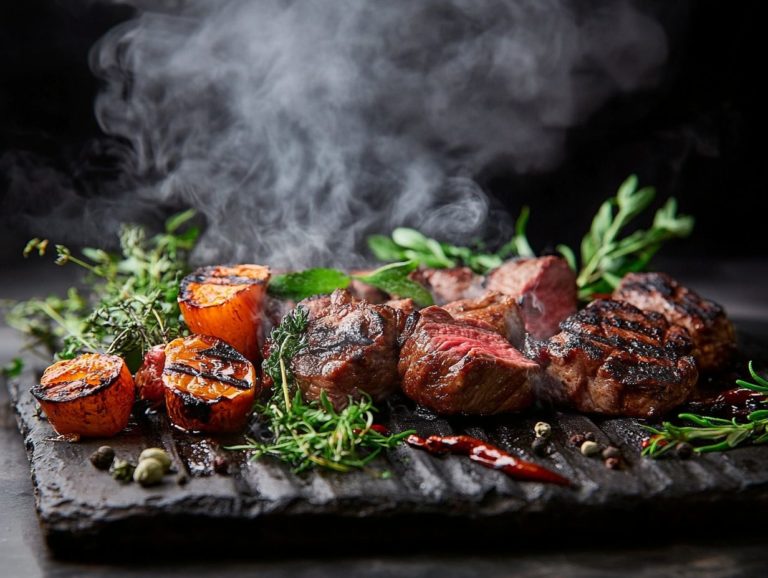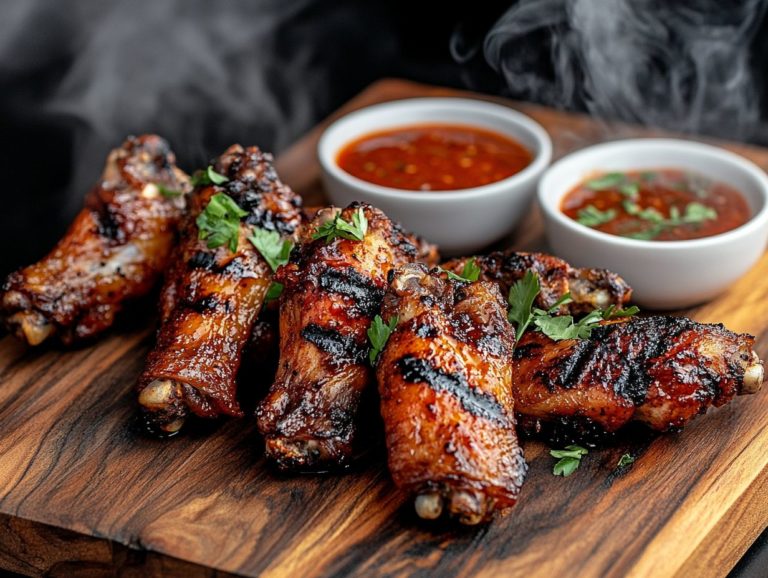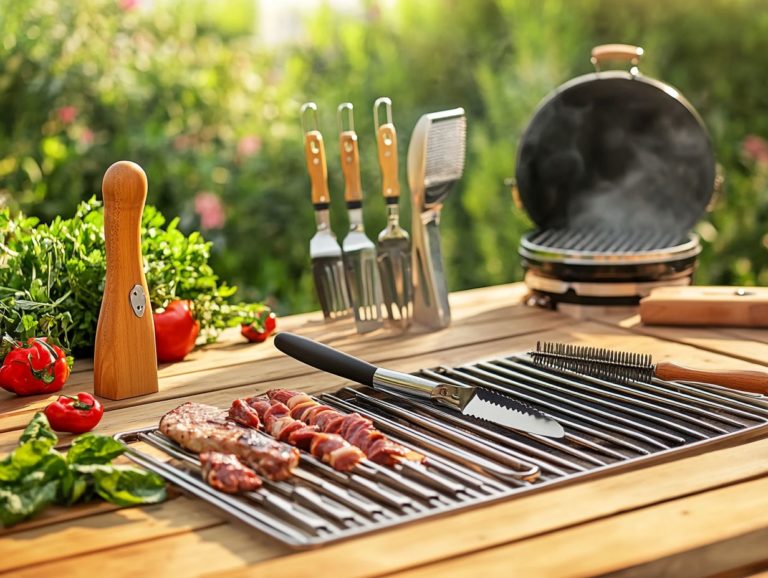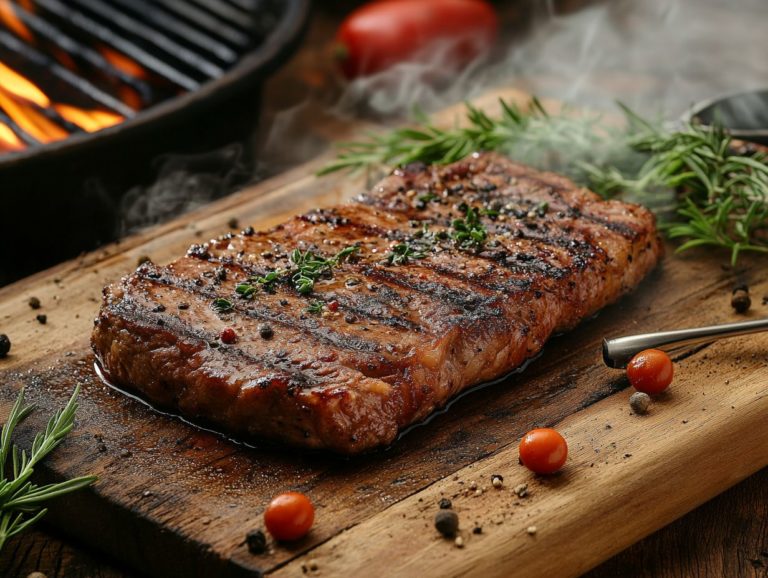5 Tips for Grilling in Cold Weather
Grilling doesn’t need to take a backseat when the temperature drops; in fact, cold weather can add a delightful twist to your outdoor culinary adventures. Let s dive into the exciting world of winter grilling and keep those flavors alive!
Whether you consider yourself a seasoned grill master or a newcomer to the grill game, knowing how to adapt your techniques is vital for achieving mouthwatering results. This guide presents five practical tips designed to help you prepare your grill, select the perfect foods, maintain optimal temperature, and savor the experience all while keeping safety at the forefront.
Prepare to keep the flavor alive, no matter how chilly it gets!
Contents
- Key Takeaways:
- 1. Prepare Your Grill and Equipment
- 2. Choose the Right Foods to Grill
- 3. Monitor the Temperature Closely
- 4. Create a Wind Barrier
- 5. Dress Appropriately and Stay Warm
- How Cold Weather Affects Grilling
- Frequently Asked Questions
- What are some tips for grilling in cold weather?
- Can I use my regular grill in cold weather?
- Do I need to adjust my cooking times when grilling in cold weather?
- How can I prevent my grill from freezing in cold weather?
- Can I still have a successful grilling experience in cold weather?
- What are some recommended dishes for grilling in cold weather?
Key Takeaways:
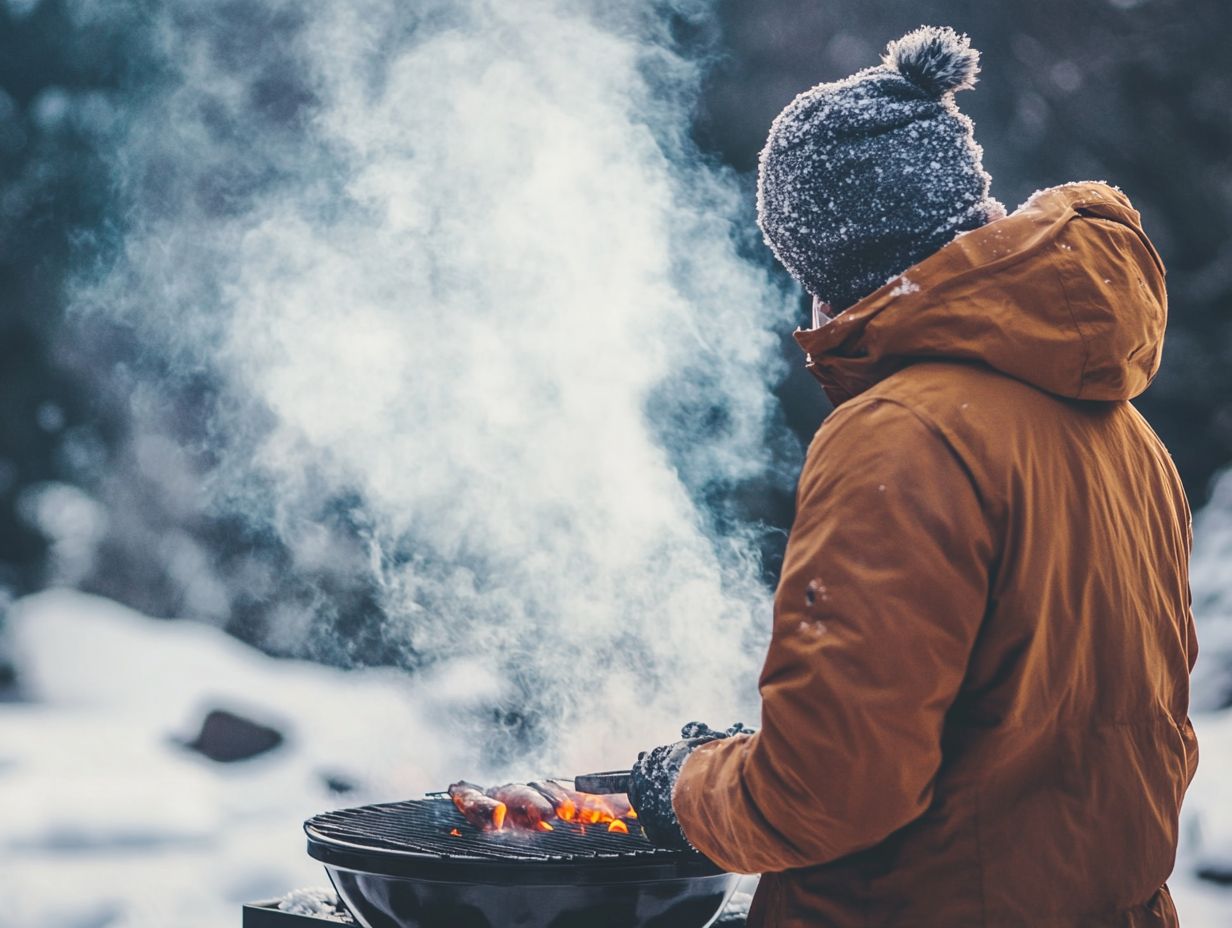
- Prepare your grill and equipment before grilling in cold weather to ensure optimal performance and safety.
- Choose the right foods to grill, such as hearty meats and vegetables, that can withstand colder temperatures.
- Monitor the temperature closely to avoid undercooking or overcooking your food in changing weather conditions.
1. Prepare Your Grill and Equipment
To ensure your winter grilling experience is nothing short of exceptional, it’s crucial to prepare your grill and equipment thoughtfully. The unique challenges of cold weather, like snow and low temperatures, can impact both cooking performance and food safety. It’s also important to follow tips for outdoor cooking safety during rain to stay safe while enjoying your outdoor cooking sessions.
Begin by cleaning the cooking grates to remove any leftover residue, which can compromise flavor and safety. For gas grills, take a moment to inspect the fuel levels. Having a backup propane tank on hand can be a game changer, preventing any cooking interruptions.
If you re a charcoal enthusiast, make sure you ve stocked up on briquettes and stored them in a dry place for optimal burning. Don t overlook the thermometer check for accuracy, as those frigid temperatures can skew readings.
Examine your heat-resistant gloves for any signs of wear; after all, keeping your hands protected is non-negotiable. And remember, always be aware of carbon monoxide risks when grilling in enclosed spaces, even if it’s just partly closed off.
Ensuring proper ventilation keeps your cooking area safe while you savor those delightful winter meals.
2. Choose the Right Foods to Grill
Choosing the right foods to grill in winter can truly elevate your outdoor cooking experience, allowing you to savor delicious flavors while keeping your friends and family cozy, even in the biting cold.
As temperatures dip, consider opting for heartier meats like marbled ribeye, which retains moisture beautifully, or succulent pork tenderloin to enhance your winter grilling adventures.
Seasonal vegetables, such as Brussels sprouts and root vegetables like carrots and parsnips, caramelize exquisitely over an open flame, bringing a sweet richness to your outdoor feast. For a delightful twist, think about incorporating Brooklyn-Style Pizza Dough to craft savory flatbreads topped with grilled veggies and melted cheese an absolute treat for both the taste buds and the eyes.
Marinate your meats with herbs, garlic, and citrus to create a warm, flavorful infusion, while dry rubs featuring smoked paprika and cumin can deliver a spicy kick that cuts through the winter chill.
3. Monitor the Temperature Closely
Monitoring the temperature closely is essential when you’re grilling in cold weather. The low outdoor temperatures can dramatically affect cooking times and the doneness of your meat, making a grill thermometer a critical tool for achieving that crispy outer layer.
In chilly conditions, your grill tends to lose heat more rapidly, which can result in uneven cooking and frustratingly long wait times. Preheat your equipment thoroughly to maintain heat before placing any food on those grates.
A reliable grill thermometer not only ensures that your grill reaches the desired temperature but also helps you check the internal temperature of meats and vegetables. For the best results, start monitoring the internal temperature a few minutes before you anticipate the food to be ready.
This proactive approach helps you make quick adjustments and guarantees flavorful, perfectly cooked meals, even in the coldest weather.
4. Create a Wind Barrier
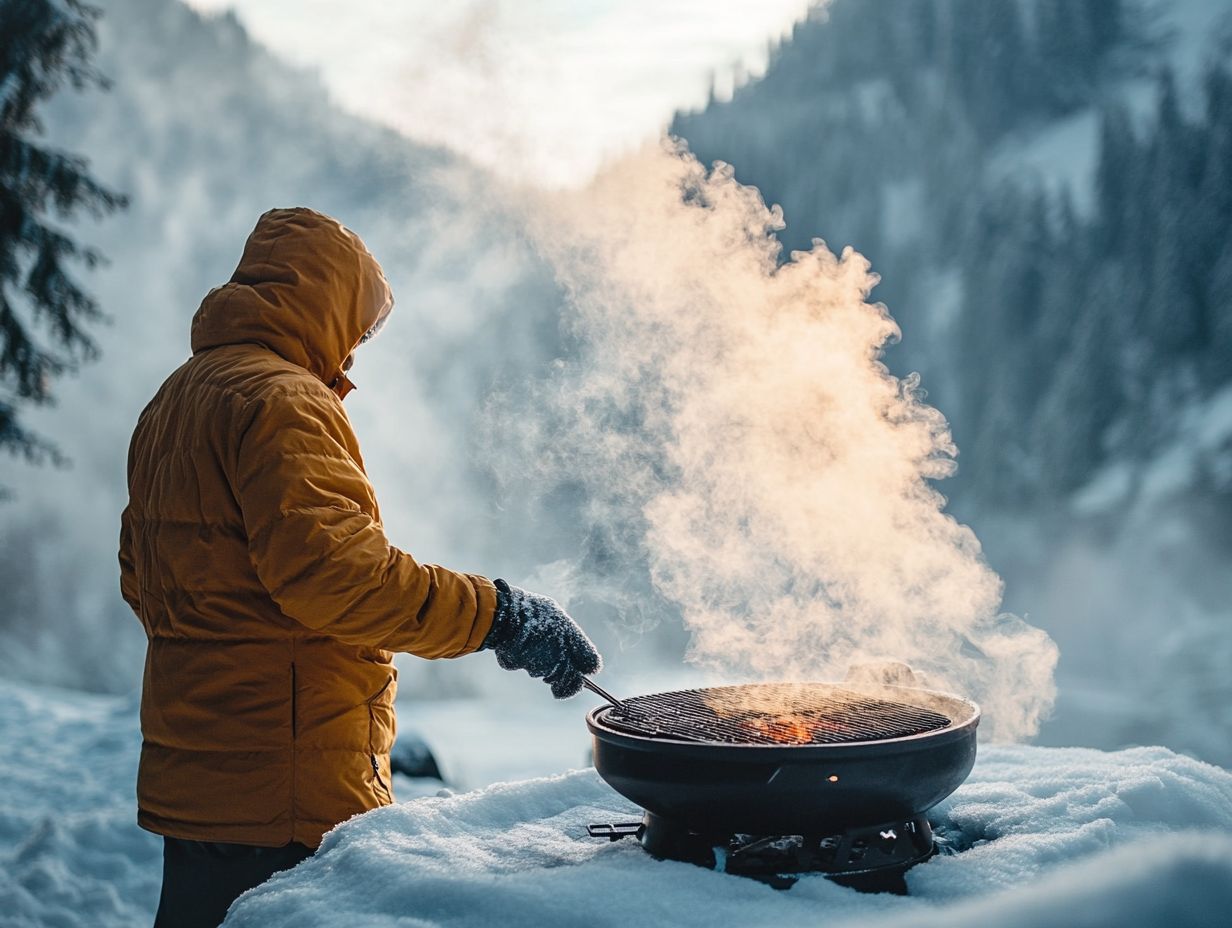
Creating a wind barrier can dramatically improve your winter grilling experience. It minimizes heat loss and ensures a steady cooking temperature. This makes your outdoor cooking safer and more enjoyable.
You have several options to establish a reliable wind barrier. Consider using blankets for warmth or tarps; these can effectively shield your cooking area from fierce gusts and add an extra layer of protection.
If you’re feeling ambitious, you can also build outdoor kitchen structures like wind walls. These not only provide physical barriers but also enhance the overall look of your space. For a more natural approach, think about planting trees or shrubs around your grilling area; they create an effective and eco-friendly shield against the wind.
It’s essential to prioritize insulation and implement safety measures to keep your cooking setup secure, even in blustery conditions.
5. Dress Appropriately and Stay Warm
Dressing appropriately during winter grilling is essential. The right clothing enhances your comfort and allows you to enjoy the grilling process, even in the chill.
To achieve this, consider layering your outfit with heat-retaining materials like thermal tops or insulated jackets. These layers trap warmth while allowing you to move with ease.
When you head to the grill, don t forget to wear grilling accessories like barbecue gloves. They protect your hands from both the cold and the heat, ensuring your safety.
Insulated aprons can also be a game-changer. They keep your core warm while giving you easy access to your utensils. Balancing comfort and safety is vital as you move around the grill in brisk temperatures. This way, your grilling experience can remain enjoyable and stress-free.
How Cold Weather Affects Grilling
Cold weather can significantly impact your grilling experience. It alters cooking times, complicates temperature control, and introduces new safety considerations. To ensure successful outdoor cooking during winter, consider these fire pit cooking tips for winter cookouts to adapt your techniques effectively.
As temperatures drop, the heat from your grill dissipates quickly, leading to longer cooking times than usual. This can really test your patience! You ll need a thermometer to ensure your food is cooked just right.
Maintaining a consistent temperature becomes challenging; you’ll need to keep the grill covered and may have to increase your fuel usage. The chilly air can pose safety hazards, from frostbite for those tending to the grill to an increased risk of carbon monoxide buildup.
Understanding these factors is crucial if you want to continue grilling safely and deliciously throughout the frosty season.
What Are the Best Types of Grills for Cold Weather?
Choosing the right grill for cold weather is key to achieving optimal cooking results. Consider options like Spirit Gas Grills and various Weber models, which are specially designed to tackle winter grilling challenges.
If you love the rich, smoky flavor that only charcoal can deliver, check out brands such as the Weber Performer and Kamado Joe. They offer excellent insulation properties.
On the other hand, pellet grills, especially those from Traeger, excel at maintaining a consistent temperature, making them user-friendly even in frigid conditions.
While gas grills provide convenience, they may struggle to retain heat in severe cold. Customer reviews show that many grilling enthusiasts appreciate the versatility of pellet grills but also value the simplicity of gas models. This highlights the diverse preferences when it comes to winter grilling.
Get ready to enjoy grilling, even in winter!
Safety Precautions for Grilling in Cold Weather
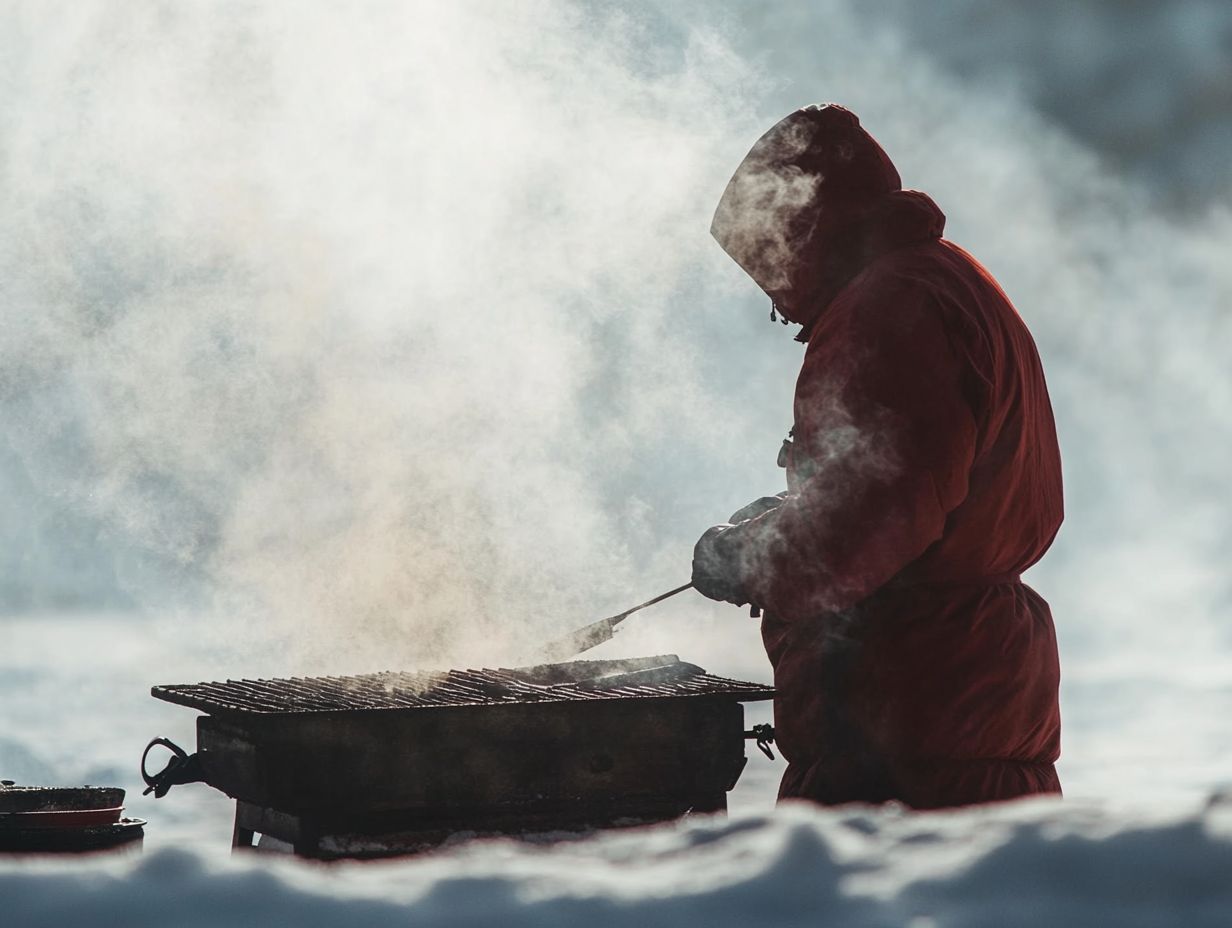
Taking safety precautions when grilling in cold weather is essential for preventing accidents and ensuring an enjoyable experience. If you’re curious about specific guidelines, here’s what you should know about cooking outdoors in winter, especially regarding carbon monoxide risks and proper grill maintenance.
To enhance your grilling safety, using a grill thermometer is crucial for accurate temperature readings. This ensures your food is cooked thoroughly while minimizing the risk of foodborne illnesses which can make you sick from improperly cooked food. Always keep an eye on carbon monoxide levels, as they can accumulate in enclosed spaces and pose serious health risks. Position your grill outdoors, at least 10 feet away from walls or overhanging branches, to reduce potential hazards.
Regular maintenance checks, such as cleaning the burners and hoses, will not only extend your grill s lifespan but also help prevent flare-ups and malfunctions. By following these tips, you can savor delicious meals without compromising safety!
Tips for Maintaining Heat in the Grill
Maintaining heat in your grill during the colder months requires some smart choices. Consider using insulation and additional accessories to ensure your cooking remains efficient, no matter how chilly it gets outside.
One effective technique is wrapping specific areas of the grill in aluminum foil, which can significantly reduce heat loss while grilling. Using thermal blankets helps your grill retain warmth for longer, preventing that dreaded temperature drop mid-cook.
It s also essential to manage your lids wisely; keeping them closed minimizes heat escape and maximizes efficiency. Preheating the grill for an adequate duration establishes a solid base temperature. Don t forget: adding a few extra coals or maintaining a consistent flame will keep that desired heat level steady, ensuring perfectly cooked meals, no matter the weather conditions!
Add Flavor to Your Grilled Foods in Cold Weather
Elevating the flavors of your grilled foods during the colder months can truly enhance your outdoor cooking experience. Embrace creative seasoning methods and unique recipes that shine in wintertime.
Delve into warming spices like smoked paprika, cumin, and coriander; they can add a comforting depth to various meats and vegetables. For example, a straightforward marinade of olive oil, garlic, and fresh herbs works wonders on winter root vegetables like carrots and parsnips, bringing out their earthy richness.
Regarding meat, think about robust choices marinating hearty cuts of beef or pork in a mix of soy sauce and ginger provides a delightful kick that contrasts beautifully with the crisp, cold air. If you’re in the mood for a unique twist, consider transforming classic Brooklyn-Style Pizza into a grilling masterpiece. Layer it with creamy cheeses and savory toppings right over the flames, and it will bring warmth and cheer to your winter gatherings!
Common Mistakes to Avoid When Grilling in Cold Weather
When grilling in cold weather, several common mistakes can derail your cooking efforts. Failing to preheat the grill adequately or not closely monitoring the temperature can lead to undercooked food definitely not what you want.
To ensure your meals are perfectly cooked, even in chilly conditions, it’s essential to sidestep these pitfalls. Many grillers underestimate how significantly low outdoor temperatures can impact cooking times and heat retention, especially when it comes to safe outdoor cooking in windy conditions.
Preparation is paramount; covering your grill to trap warmth and opting for thicker cuts of meat can elevate your results. Monitoring both the grill and food temperatures with reliable techniques will help you avoid any potential mishaps.
Being aware of these winter grilling challenges enhances your experience and guarantees that every bite is as satisfying as you intended!
Frequently Asked Questions
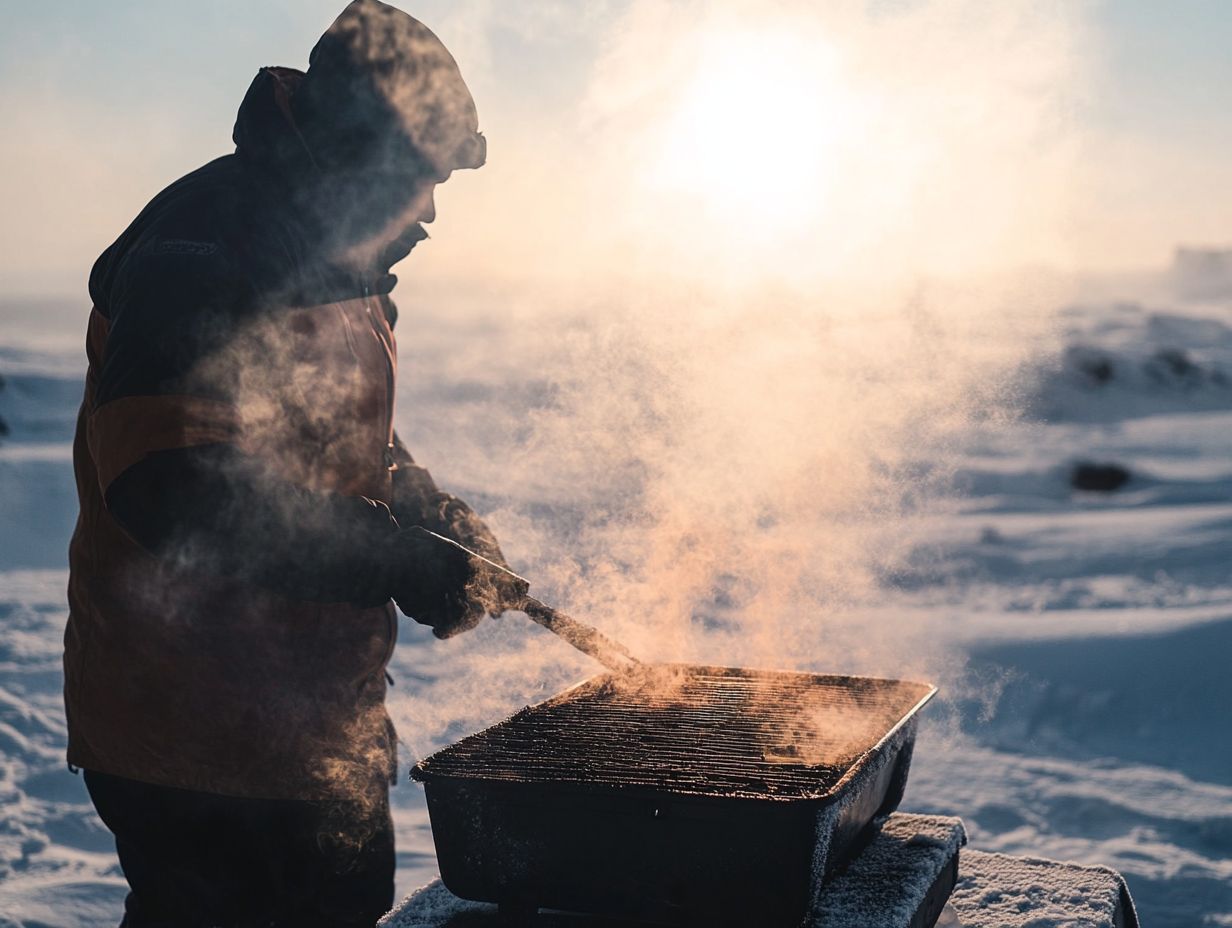
What are your favorite cold-weather grilling tips? Don’t miss out on grilling delicious meals this winter! Check out these 5 tips for grilling in windy conditions to enhance your experience.
What are some tips for grilling in cold weather?
1. Insulate your grill to maintain heat and prevent escape.
2. Use a grilling thermometer to keep track of temperature, as cold weather can alter cooking times. Additionally, following 5 tips for safe fire pit cooking can enhance your outdoor cooking experience.
3. Preheat your grill longer than usual for best results.
4. Cover your grill when not in use to avoid snow or ice buildup.
5. Choose a gas grill for quicker ignition and consistent temperatures.
Can I use my regular grill in cold weather?
Yes, you can use your regular grill in cold weather. Just take extra precautions to grill successfully.
Do I need to adjust my cooking times when grilling in cold weather?
Yes, adjust your cooking times as colder temperatures can affect them. Use a grilling thermometer to ensure thorough cooking.
How can I prevent my grill from freezing in cold weather?
Cover your grill when not in use and store it in a dry area. Consider a grill cover designed for cold weather for extra insulation.
Can I still have a successful grilling experience in cold weather?
You can absolutely enjoy grilling, even in cold weather, with the right tips! Follow our 5 tips for grilling in rainy weather and use the right tools for perfect food.
What are some recommended dishes for grilling in cold weather?
Grill up hearty meats like succulent steak, juicy pork chops, or flavorful chicken. Don’t forget robust vegetables like potatoes and squash, or warm up with grilled cheese sandwiches!

